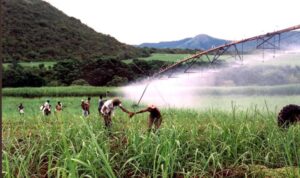Introduction
Co-operatives are not only for the poor, but of all the different types of business organisations, co-operatives reach down most to the low income groups. The main feature of co-operatives is that they help people to help themselves.
Helping people to help themselves means:
- making them aware of needs and problems they have in common;
- giving them access to information about co-operative values, principles and practices;
- giving them the chance to learn how to work together the co-operative way for the benefit of each individual member and of the group as a whole.
National and provincial government promote co-operatives as a type of business entity and a means to get informal economic actors involved in and benefitting from the formal economy.
Co-operative models offer farmers the same scale of benefits that would usually be reserved for larger operations. Better prices for farming inputs can be negotiated by forming buyer groups, and working together on marketing can offer clients better security of supply.
What isn’t possible for the individual is possible when many individuals act together.
Co-operatives: a definition
A co-operative is defined as “an autonomous association of persons united voluntarily to meet their common economic, social and cultural needs and aspirations through a jointly owned and democratically controlled enterprise” (definition by the International Co-operative Alliance).
We can break down this definition into five main points in order to understand it more clearly:
- A co-operative is an independent organisation. It must stand or fall on its own feet.
- A co-operative is a group of persons who freely decide to come together to meet common needs and goals.
- A co-operative is jointly owned. Its primary duty is to its members, not to anyone else outside the co-operative. The benefits of the co-operative are shared by all of the members.
- A co-operative is controlled democratically, so that each member has an equal voice in decisions.
A co-operative must follow co-operative principles (see next heading) in its organisation and activities.
Seven Co-operative Principles
There are seven co-operative principles that are followed by co-operatives all over the world. Everyone who is involved in a co-operative should know and understand these basic co-operative principles.
- Voluntary and open membership – nobody is forced to be a member, and there is no gender, social, racial, political or religious discrimination.
- Democratic member control – Co-operatives are democratic organisations controlled by their members, who actively participate in setting their policies and making decisions. Elected representatives are accountable to the membership. In primary co-operatives members have equal voting rights (one member, one vote). Members becoming uninvolved often leads to the collapse of the co-operative.
- Member economic participation – Members contribute equitably to, and democratically control, the capital of their co-operative. At least part of that capital is usually the common property of the co-operative. Surpluses may be used to develop the co-operative further; paying members in proportion to their transactions with the co-operative; and supporting other activities approved by the membership.
- Autonomy and independence – Co-operatives are independent, self-help organisations controlled by their members. If they enter into agreements with other organisations, including governments, or raise capital from external sources, they do so on terms that ensure control remains with their members.
- Education, training and information – Co-operatives provide education and training for their members, elected representatives, managers, and employees so they can contribute effectively to the development of their cooperatives. They inform the general public – particularly young people and opinion leaders – about the nature and benefits of co-operation.
- Co-operation among co-operatives – Co-operatives serve their members most effectively and strengthen the co-operative movement by working together through local, national, regional and international structures.
- Concern for community – Co-operatives work for the sustainable development of their communities through policies approved by their members.
The co-operative principles are guidelines by which co-operatives put their values into practice.
Types of co-operatives
Co-operatives are usually understood to be either an agricultural form of business or a state-driven welfare intervention. The law does not place any limit on the kinds of co-operatives that can be registered, though. These are some of the possibilities:
- An agricultural co-operative is a co-operative that produces, processes or markets agricultural products and supplies agricultural inputs and services to its members.
- A consumer co-operative is a co-operative that gets and distributes goods to its members and non-members, and also provides services to its members. A co-operative which buys bulk groceries and sells them to its members and to the public, while giving its members a special discount or a refund based on the amount of their transactions, is an example of a consumer co-operative.
- A marketing and supply co-operative means a co-operative that supplies production inputs to members and markets or processes their products. An example is a sewing co-operative that provides fabric and sewing machines to its members and then markets the items they sew. This category also includes agricultural marketing and supply co-operatives.
- A housing co-operative is a primary co-operative that provides housing to it members, or a secondary co-operative that provides technical service to primary housing co-operatives.
- A financial services co-operative is a primary co-operative with the main purpose of providing financial services to its members, or a secondary co-operative that provides financial services to a primary co-operative. An example is a savings and loan co-operative, where the members pool their savings and make loans to each other.
- A social co-operative is a non-profit co-operative that provides social services to its members, such as care for the elderly, children and the sick.
- A co-operative burial society is a co-operative that provides funeral benefits, including funeral insurance and related services, to its members and their dependants.
- A services co-operative is a co-operative that provides housing, health care, child care, transportation, communication or other services.
- A worker co-operative is a primary co-operative that provides employment to its members, or a secondary co-operative that provides services to primary worker co-operatives.
NOTE: It is possible to combine different types of co-operatives into a multi-purpose co-operative.
Why form agricultural co-operatives?
The importance of agricultural co-operatives is job creation, mobilising resources, generating investment and their contribution to the economy. In their various forms agricultural co-operatives promote the fullest participation in the economy and social development of all people.
Agricultural co-operatives serve their members in the following ways:
- Improve bargaining power: combining the volume of several members improves their position when dealing with other businesses.
- Reduced purchasing costs: volume purchasing reduces the purchasing price of needed supplies.
- Obtain market access or broaden market opportunities: more buyers are attracted because of the value you can add, and the assurance you can offer to clients looking for larger quantities.
- Improve products or service quality: member satisfaction is achieved through improved facilities, equipment and services.
- Obtain products or services otherwise unavailable: agricultural co-operatives often provide services or products that would not attract other private businesses.
- Reduce cost / increase income: reducing the operating costs increases the amount of earnings available for distribution to members to boost their income.
Source: Adapted from Guidelines for establishing Agricultural Co-operatives. Find the document on www.dalrrd.gov.za.
If there is a group of you – or even a whole community – who want to start an enterprise where everyone benefits equally, and where profits are equitably shared with everyone involved, then it makes sense to start a co-operative enterprise. It must still be operated and managed with the same discipline and systems that apply in any business, so that people work efficiently and income exceeds expenditure, even if its principles are different, ensuring that the benefits of the enterprise are more widely spread.
Finances
See notes on the CBDA, NACFISA, IMVABA, Dora Tamana etc. under the “More role players” heading.
Grants and donations
Some co-operatives try to raise additional funds from donor and development agencies, NGOs or governmental sources, who occasionally set aside funds to support co-operative development.
Grants and donations are a possible way to help a co-operative that is struggling to obtain access to funds. Nonetheless it must be noted that this source of funding carries with it potential problems:
- They can contribute to dependency, as co-operative members may have less incentive to make the organisation work on its own feet. In the long term this might mean that co-ops do not become self-reliant and wait for an outside agent to intervene whenever there are problems.
- They can also mean some loss of autonomy as many grants will have conditions attached, according to the agendas of the funding bodies. Grants and donations available to co-operatives can be researched by looking at the various corporate social investment schemes offered by private companies, parastatals, and government departments.
Loans
Most small business enterprises in the world obtain funding through the lending cycle. Applying for loans is an important way for co-operatives to access the capital needed to purchase equipment and pay for training of co-operative members. The drawback to this form of funding is the limited access many poor South Africans have to financial institutions as well as the high interest rates and services fees charged to people.
Several provincial development agencies provide finance for co-operatives. Find their details under the “More role players” heading.
Other
The Co-operative Incentive Scheme (CIS) provides a direct cash grant for registered primary co-operatives (five or more members). Refer to www.dsbd.gov.za or https://industrialfinancing.co.za.Also find the National Association of Co-operative Financial Institutions of South Africa (NACFISA) entry under the “More role players” heading.
Check out the “Finance for new farmers and SMMEs” page for other sources of financial assistance.
National strategy and government contact
Co-operatives have been so successful in certain parts of the world that the South African government wants more people to start co-operatives here. In countries worldwide, co-operatives play a stabilising role in rural areas. If co-operatives are set up in the right way – with enough commitment, support and planning – they can play a major role in helping provide jobs and fight poverty.
Co-operatives fall mostly under the Department of Small Business Development (DSBS). Find details of the Co-operative Incentive Scheme at www.dsbd.gov.za.
The National Apex Cooperative of South Africa (NACSA); South African National Apex Cooperative (SANACO); and National Cooperatives Association of South Africa (NCASA) presented progress reports on structural development and focus areas of cooperatives organisations to the Small Business Development parliamentary committee (2019, March 6). Find notes of the meeting and presentations at https://pmg.org.za/committee-meeting/28060/.
Visit www.thedtic.gov.za, website of the Department of Trade, Industry and Competition (the dtic). The dtic has created an enabling environment for co-operatives through the Co-operative Development Policy, the Co-operatives Act and the Integrated Strategy on the Development and Promotion of Co-operatives, as well as the Co-operative Banks Act. Read more about these on the dtic website. Much of the responsibility for co-operatives has been transferred to the new Department of Small Business Development, yet the dtic remains a very relevant government role player shaping the world of co-operatives.
Companies and Intellectual Property Commission (Previously CIPRO)
For the registration of co-operatives in South Africa
Department of Agriculture, Land Reform and Rural Development (DALRRD)
Directorate: Co-operatives and Enterprise Development (D: CED)
DALRRD provides training for co-operatives. Three sub-directorates make up the D: CED and are of relevance here:
- Business Development (BD)
- Rural Enterprise Development (RED)
- Co-operative Development (CD)
Find information on their offerings on their webpages at www.dalrrd.gov.za. Details of the AgriBEE Fund can also be accessed here.
Several other directorates which will be of help include:
- Marketing
- Small Holder Development
- Development Finance
The National Apex Cooperative of South Africa (NACSA); South African National Apex Cooperative (SANACO); and National Cooperatives Association of South Africa (NCASA) presented progress reports on structural development and focus areas of cooperatives organisations to the Small Business Development parliamentary committee (2019, March 6). Find notes of the meeting and presentations at https://pmg.org.za/committee-meeting/28060/.
Co-operative Banks Development Agency (CBDA) www.treasury.gov.za/coopbank
Role players
Further reference:
- The Agricultural Colleges run short courses on agricultural co-operative management. Find contact details on the “Agricultural education & training” and “Agriculture in the provinces” pages.
- The Agricultural Research Council (ARC), as part of rural development work, provides training and support to co-operatives. See www.arc.agric.za.
International business environment
Find co-operative news, events and more at www.thenews.coop
- Find the Alliance Africa pages on https://icaafrica.coop/en, website of the International Co-operative Alliance
- ACCOSCA, the African Confederation of Cooperative Savings and Credit Associations (see www.accosca.org) together with countries from other regions makes up WOCCU, the World Council of Credit Unions (www.woccu.org is the website). WOCCU sees South Africa as a country with great growth potential, as millions of people are inadequately served by the banking sector.
- The National Cooperative Business Association, CLUSA International (NCBA CLUSA) began as the Cooperative League of America. Read more about its work and international offerings at https://ncbaclusa.coop.
- ACDI VOCA is “expanding opportunities worldwise”. See http://acdivoca.org.
- Co-operatives UK – www.uk.coop
Find documents on www.copac.org.za like World declaration on worker cooperatives and International Co-operative Alliance: Statement of the co-operative identity.
Websites and publications
Visit the websites of role players mentioned on this page.
- Find seventeen manuals on developing a co-operative at www.dalrrd.gov.za. Their titles are: (1) What is a cooperative? (2) The duties and functions of the board members of a cooperative (3) The role of the manager of the cooperative (4) Entrepreneurship in cooperatives (5) Starting your agricultural business (6) The staff of the agricultural business (7) Developing a business plan (8) Managing your business (9) Equipment facilities (10) Financing your agricultural business (11) Financial management (12) General administration (13) Packaging, pricing & storage (14) Success for the agricultural business (15) Marketing (16) Shoplifting and (17) Working together (unity). Also see the Info Pak “How to form a co-operative”.
- Various research issues are explored relating to co-operatives – enquire at faculties such as the Social Science/economics departments or websites of universities, or at organisations referred to in this chapter e.g. the Co-operative and Policy Alternative Centre (COPAC). Find news of publications like Create Work Through Worker Cooperatives – Activists Guide on their website, www.copac.org.za.
- Find Stokvels – A Hidden Economy by African Response at www.africanresponse.co.za/assets/press/2012StokvelHiddenEconomy.pdf
Some articles
- Manoko T. 2024, December 19. “Millions lost, 65 jobless as NC poultry cooperative shuts down”. Food for Mzansi. Available at www.foodformzansi.co.za/millions-lost-65-jobless-as-nc-poultry-cooperative-shuts-down
- Reporter. 2023, April 28. “SA signs agreement to benefit cooperatives”. SA News. Available at www.sanews.gov.za/south-africa/sa-signs-agreement-benefit-cooperatives
- Sadiki R. 2019, October 29. “Changing women’s lives the cherry on top for co-op”. Sowetan Live. Available at www.sowetanlive.co.za/business/2019-10-29-changing-womens-lives-the-cherry-on-top-for-co-op/
- Erasmus, D. 2019, February 19. “Co-ops are making a comeback”. Farmer’s Weekly. Available at www.farmersweekly.co.za/opinion/blog/letter-from-the-editor/co-ops-are-making-a-comeback/
- GCIS Vuk’uzenzele. 2018, October 19. “Here’s how to make money from a co-operative project”. Sunday Times. Available at www.timeslive.co.za/sebenza-live/features/2018-10-19-heres-how-to-make-money-from-a–co-operative-project/
- Sinyolo, S. 2018, June 19. “Why it’s beneficial to organise smallholder farmers into groups”. The Conversation. Available at https://theconversation.com/why-its-beneficial-to-organise-smallholder-farmers-into-groups-98028
- Manala, L. 2018, June 6. “Govt commends woman-run agricultural co-ops in Alexander”. The Citizen. Available at https://citizen.co.za/news/south-africa/1946953/govt-commends-woman-run-agricultural-co-ops-in-alexander/
- Moloi, T. 2018, February 2. “How Stokvels Allow You To Make Smart Purchases Through Group Buying Power”. Entrepreneur Magazine. Available at https://www.entrepreneurmag.co.za/advice/financial-management/cash-flow/how-stokvels-allow-you-to-make-smart-purchases-through-group-buying-power/
- Tucker, B. 2017, November 30. “Alive with possibilities: Rural community builds SA’s first co-op internet provider”. BIZNEWS. Available at www.biznews.com/good-hope-project/2017/11/30/sa-first-co-op-internet-provider/
- Find the blog “Boosting African agribusiness with a new generation of cooperatives” which includes a look at six principles for cooperative agribusiness in Africa. Go to http://blog.ciat.cgiar.org/boosting-african-agribusiness-with-a-new-generation-of-cooperatives/
- Mashala P. 2013, February 6. “Bana ba Kgwale vegetable project assists community”. Farmer’s Weekly. Available at www.farmersweekly.co.za/rural-insight/bana-ba-kgwale-vegetable-project-assists-community/






